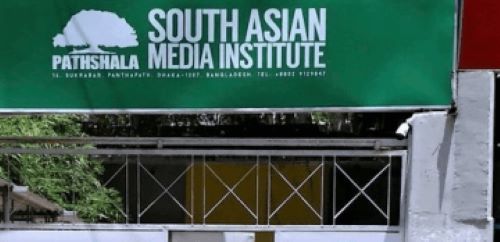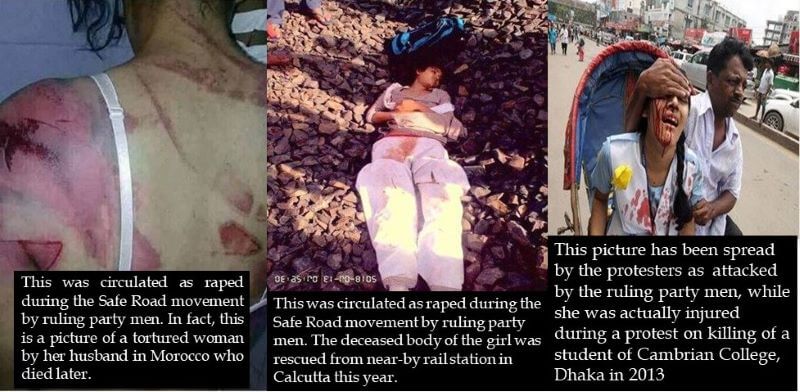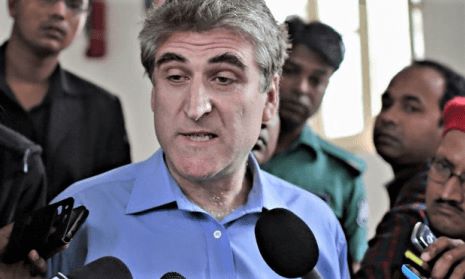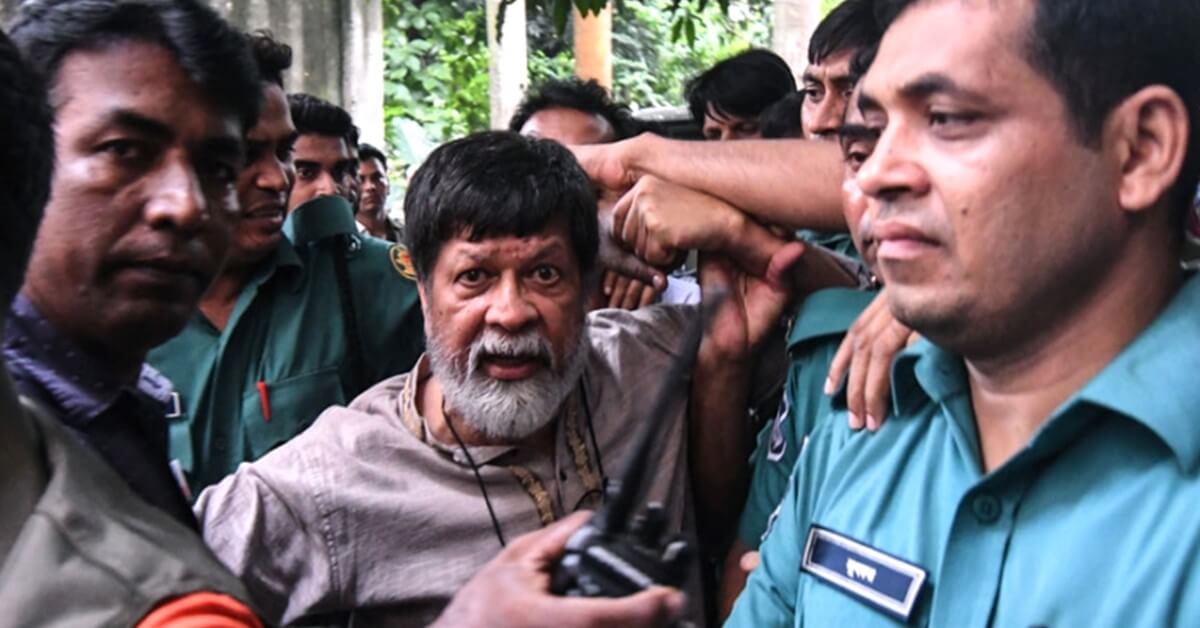Last updated on July 30th, 2023 at 06:42 pm
Bangladeshi award-winning eminent photographer Shahidul Alam was arrested by the current government which has drawn a huge amount of criticism and condemnation from a number of rights groups at home and abroad. Condemnations against the arrest have been pouring in demanding his release. But, apart from the arrest of the brilliant mind, there is something disgraceful attached to his activities that justifies the very reason behind his arrest.
How do you react when you see our brilliant minds are arrested, tortured, questioned their integrity and freedom of conscience and expression has been curtailed? Does the meaning of brilliance lie in staying on the side of chaos, destruction, hooliganism, provocation, and promoting disorder? Is it not that the aim of a brilliant mind is to educate and enlighten and to dictate innocuous ideals and advocating human values? How far can we go as citizens of a sovereign state regarding fostering individual interest?
These questions relate to the current debate centring on the arrest and custodial torture of an internationally renowned and award-winning Bangladeshi photographer, Shahidul Alam. His arrest reveals more of himself than the cocky treatment of the state.
Numerous national and international print and satellite media, right groups, intellectual quarter, and political movements fiercely condemned the arrest which followed during the recent student protest of the ‘Safe Road movement’ that started to take root after the shocking killing of two students of Shahid Rameez Uddin Cantonment College on 29 July by a speeding bus in the capital city of Bangladesh.
According to Al-Jazeera’s online version, the photographer Shahidul Alam’s arrest took place after his interview about the movement via Skype with Al-Jazeera.
The government decided to arrest him under section 57 for spreading provocative and derogatory remarks against the state. In the interview, Mr Alam admitted that the students’ protests indeed were not all about Road Safety, but ‘something larger is going on there’ meaning people want the government to step down as it has failed its citizens on security protection.
He said that the ‘current government has no public mandate to rule. Looting of the banks, gagging of the media, forced disappearance, bribery at all levels, corruption in education, and the protests are burst of the anger of the people, consequently. Police specifically asked help from the party armed goons to combat the unarmed students demanding ‘Safe Road’, and the police were helping the party people chasing the students with machetes’.
He brought the host of the allegations to the media against the current government while he himself did not forget to procure its blessings just a few years ago.
However, I am very much surprised to see that the video has been removed from YouTube!
Is he telling us that the ‘Safe Road’ demand has nothing to do with reckless driving and the greedy public bus owners and safety, but rather it was a collective cause of taking the street in order to make the government’s position volatile and tarnish Bangladesh’s image in the international arena?
Is there any underlying motive of Mr Alam? Or is it simply Al-Jazeera’s media propaganda of which Mr Alam is simply a mean? Is he playing a morally double-minded role in between the current government and the West? Is he trying to be empathised by the West?
First thing first: Mr Shahidul Alam founded the Pathshala South Asian Media Institute in 1998 which offers graduation and diploma in photography and cinema and certificates to the participants. But, Mr Alam has managed the institution in a high-handed manner and without any approval from the related authority in Bangladesh.
Over the period, Mr Alam was able to maintain his position and gain financial donations from home and abroad. That too after the 2014 election on January 5. His illegal or controversial academy got approved by the current Awami League government of Sheik Hasina whom he terms as ‘a ruler without a public mandate’, along with a piece of land.
Hilariously, the legality and ethical question of the government was discounted when he sought approval of his institution from an unelected government. How could he ask for any assistance from a de facto government and question its legality afterwards?

Some say he was not serious enough to get the Pathshala approved so he can maintain his grip on its power in an ‘autocratic’ style of ruling and so he can fire anyone whenever he wants in order to remain uninterrupted. He acquired ‘millions of foreign donations in the name of Pathshala and used it to other institutes, like ‘Drik’.
In 2011, the Netherlands approved TK 85 million for Pathshala. Questioning the legality of mishandling the donation, the then-education minister Nurul Islam Nahid termed it ‘fraud’.
Speaking of which, after keeping pended for 18 years, he was forced to get approved the Pathashala because local institutional recognition was necessary to award certificates for such courses. His logic was, ‘despite any recognition by the local authorities some foreign authorities have recognised the value of his efforts’.
Let us not argue, for the being time, about the rationale of the government behind approving the institution, as it can be done on many legal grounds. Is Mr Alam fed up with the government because it interfered in his institution in getting it approved forcibly? Or, because he lost his autocratic control of it?
The public sentiment nowadays has been hijacked by some popular terms, like ‘revolution’, ‘justice’, ‘intellectuality’, ‘hero’ and ‘atheist’. Therefore, anyone who speaks against the incumbent ruling government catches the public attention being a ‘street hero’, ‘revolutionist’ and ‘bold’, while many do it intentionally, purely for cheap publicity.
Moreover, one who raises his voice against any administrative delinquency is no doubt a voice of ‘hope and justice’. But, feeding people with substandard and unverified information, and politically motivated misinformation deliverer is unfortunately considered an ‘intellectual’ while using unjustified political muscle to terrorise people as ‘heroic’. And one is termed ‘atheist’ if he somehow speaks against religious convention.
To speak of the ‘safe road movement’, it must be admitted that, in the initial stage, it was a pure, unquestioned and unconditional demand of the people of all walks. Taking the severity of reoccurring gruesome traffic injuries and loss of precious life into consideration, demanding ‘Safe Road’ is a timely demand to ‘Safe Life’. The World Bank survey has placed Bangladesh on 103 on the Road Traffic Injury count, in 2016 while according to WHO 13.6 is the death rate of Road Traffic Injuries in 100,000 people. At least 20 people die every day on average in Bangladesh.
In such a deplorable situation, the people of Bangladesh have long been expecting a commuter-passenger friendly provision, so none of the guilty drivers goes scot-free after committing an accident by reckless driving. The cost of injury and losing the chance of a decent livelihood by the traffic accident is truly unbearable and too high in a country where the public out-of-the-pocket health cost is as high as 64%.
However, as days went by, the Safe Road Movement embroiled itself with the political schema. It has become an agenda of the vested quarter and a means to paralyse the country in bringing down the government. I personally witnessed the protest at the primary stage and saw how peaceful and harmless it was to the people and the public properties. Vandalizing 500 buses, burning, picketing, and looting was too daring work to some high-school-going students.
Destructive, paralysing actions came onto the scene as people from the motivated quarters had an entry to the cause. The report verified that hired thugs, terrorists from many terrorist outfits and Islamist groups blended in with the opposition party men and took to the streets in order to destabilise the political scene. Non-students and people who left college finishing education gained an entry with the school-college uniforms on.
Consequently, the selling of white-colour uniforms sky-rocked overnight across the country, unprecedentedly. Rumours, hate-speech, propaganda, foul-mouthing, vulgar signs, and using children with demoralised placards increased many folds. The pure and thoroughgoing police personnel guarded protest turned into a purely political issue to gain control of the power.
Photo-shopped photographs, unrelated and misdated pictures, cooked-up stories, unverified information, misleading news, and yellow journalism agitated the people and destabilised the country exactly the way it happened during the ‘War Crime Trials of the 1971’s war criminals for committing a crime against humanity.

It was the same propaganda machine that claimed that military men from India came in black uniforms and committed the gruesome ‘BDR Mutiny of 2009’ by killing hundreds of Bangladeshi military men and dumping their traces. It is the terrorist outfit that fed the rumour that the Bangladesh government killed as much as 20,000 protesters at night and dumped them in India during the ‘Hafazat-E-Islam Uprising’ in 2013.
It is the same misrepresentative agent that tailored the news that the face of a war criminal, who is serving a life term behind the bar now, was seen on the moon. But who didn’t try having a glimpse of that!
They spread all forms of rumours of rape, killing and committing genocide by the ruling party men. Many of the conscientious public bought and sold the lies and rumours unquestionably only because the political party that they do not favour is in power.
To be a prisoner of conscience is still aeon far because in a society and culture where people are ‘prisoners of politics’, political agenda fares better than human conscience. American novelist Harper Lee wrote, “The one thing that doesn’t abide by majority rule is a person’s conscience.”
Politics rules in every sphere of life where conscience, moderation, ethics, moral life, civil liberty and cultivation goodness remains at the mercy of politicians. And politicians will decide, define, codify and legalise their version of everything when we are dead and blind to the truth and beauty.
Then the government came to play its role, for which any government is responsible, in order to save the broader section of the general public from the possible greater disaster. No matter how contentious the War Crime trial is, it is still the Awami League government that was able to bring the war criminals to face the taste of justice regardless of the fact that many didn’t want that to happen and wanted to save the criminals by numerous devilish means.
Prime Minister Sheik Hasina has confronted many vilifications against her government and its credibility, which is on the ground a different debate.
The accusation of Photographer Shahidul Alam directed towards the current government ‘unelected’, in fact, links something else somewhere, more sinister and fishier.
David Bergman, the British human rights activist and a former reporter to the New Age along with leaders of the theocracy-based Islamic political party Jamaat-E-Islami of Bangladesh, formulated a secret group of 23 men from the elite class in order to stop the ‘War Crime Trial’. Not that they did not want ‘war criminals’ to be tried, but their idea of the ‘trial’ was based on ‘But’ ‘Or’ and ‘If’.
David, a son-in-law of a prominent lawyer and the author of the constitution of Bangladesh, Dr Kamal Hossain, was accused of Court Defamation along with many others who questioned the legality of the trial and the justice system of the country. However, many of them later apologised, except the 23. Fortunately or unfortunately photographer Shahidul Alam is one of the 23 of the grouping.

Funded by Emir Sheikh Hamad Bin Khalifa of Qatar, Al-Jazeera has been a controversial channel for broadcasting dissenting views and promoting Egypt-based Sunni Islamic terrorist outfit Muslim Brotherhood. Sustaining pro-Sunni and anti-Shia religious views, Al-Jazeera faced closure in Gulf countries like Saudi Arabia, the UEA, Bahrain, and Egypt for financing terrorist groups, during the ‘2017 Qatar Crisis’.
It is also under court trial in Bangladesh for making a derogatory and politically motivated documentary against Prime Minister Sheikh Hasina. Having 500 million Qatari Riyal, Al-Jazeera had started its English service after Saudi-owned BBC World Service in the Arabic language closed its operation after facing legal action, and was joined by all the news crews of BBC.
Whether Al-Jazeera picked Mr Alam or Mr Alam picked Al-Jazeera is a matter of interest. Knowing all about Al-Jazeera photographer Shahidul Alam picked it to vilify Bangladesh’s image to the Western world.
If Photographer Shahidul Alam is a man to the light for the people in his own way, then why would he get involved in a group which sustains a secretive motive against the interest of the nation?
Yes, Sheikh Hasina is ‘autocratic’ in her demeanour. But all for good for the citizens of Bangladesh. Steady financial growth, rapid ongoing infrastructural development, emerging Bangladesh to a lower-middle-income country, and curbing terrorism with an iron fist are something we cannot make light of at any cost. If it is not her, who is going to do better? What do we need freedom of speck or security?
Yet, it is still an ambitious and disproved probability for a ruler like Sheikh Hasina from a third-world county like Bangladesh. In the same breath, when after ruling Malaysia for 22 years Dr Mahathir Mohamad returned to his power as a prime minister at 92 in May 2018, and none calls him an ‘autocrat’. As the longest-serving prime minister in Asia, he too took tough stances throughout his reign against anyone who opposed his power. Consequently, he emerged as a ‘redeemer’, ‘visionary’, and ‘dreamer’ of Malaysia.
When Lee Kuan Yew led Singapore to the highest example of success through ruling Singaporeans for 30 years, none called him an ‘autocrat’ in Bangladesh.
Obviously, in our parlance, the word ‘autocracy’ takes a different definition only to question Sheikh Hasina’s credibility. Yet again, not many like her deal with bureaucrats, political favouritism, nearly non-existent principles of secularism, minority oppression and selective administration of the law. But she is the only hope we have got left, who is better than worse. Why do some of us expect our country to be like that of Malaysia, or Singapore, but not expect a leader like Lee Kuan or Mahathir Mahmud?
Mr Shahidul Alam ripped what he sowed. After all, it is the interest of the country that must be upheld sacrificing individual political polarisation. Sadly, Bangladesh fosters more traitors than patriots.
From the forces against war crime trials to Hefazat-E-Islam Uprising, Quota Reform movement and Safety Road protestation the current government of Bangladesh still fairs better. No, we won’t be able to admit that until the worse has befallen us and the photographer Shahidul Alam’s arrest has a basis of his damnation of the state.
